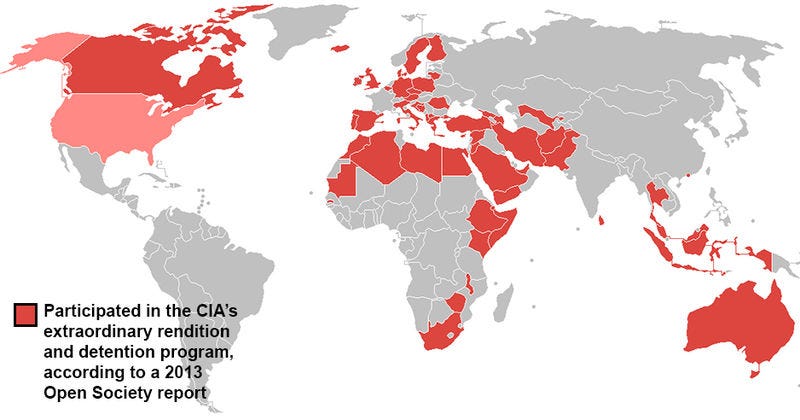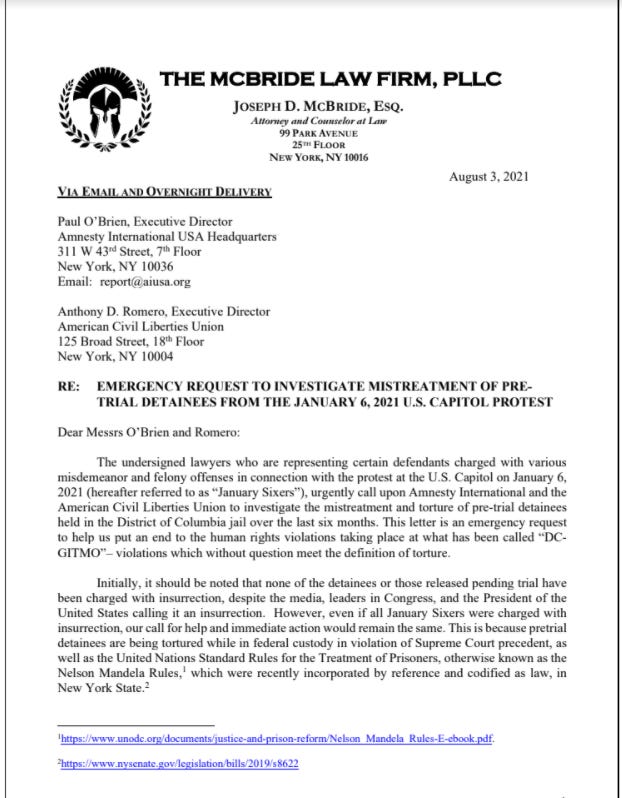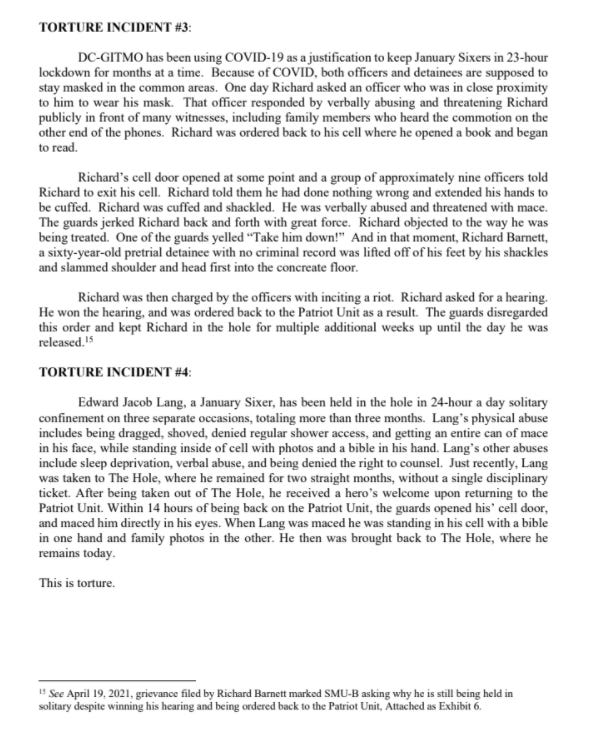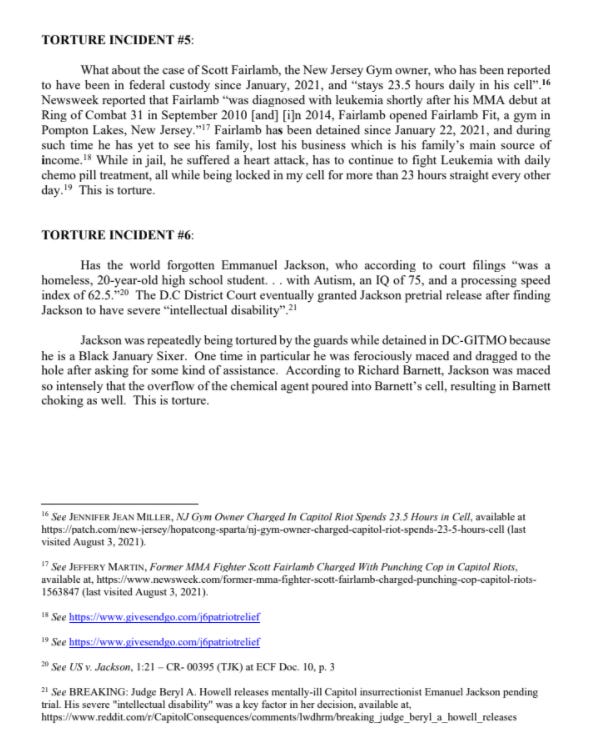Attorney: Absolute Proof of Torture at DC GITMO
Joseph McBride, Esq. has submitted an emergency request to investigate the mistreatment of pre-trial detainees from the January 6 Capitol Protest.
Attorney Joseph McBride has published a recent document alleging serious human rights violations taking place at the DC Correctional Treatment Facility also known as the DC GITMO or the Deplorable Jail. Joseph represents January 6 defendant Richard Barnett, who has become famous for a photo of him sitting with his feet up on a desk in Nancy Pelosi’s office, taken at the request of the media. Due to this high profile media frenzy, Richard became a target at DC GITMO for angry, politically motivated prison guards.
Joseph published1 the following statement on August 4, 2021 with 2 linked attachments:
Those currently seated in the highest positions of power in the United States Federal Government have refused to investigate or acknowledge the human rights violations taking place in DC-GITMO.
Because of this, we have called upon Amnesty International and the ACLU to immediately investigate the Federal Government’s use of solitary confinement and various other human rights violations against pretrial detainees charged with January Sixth related crimes.
You will find two links below related to our call for help. Link #1 is our formal request to Amnesty International and the ACLU for an immediate investigation. Link #2 contains the corresponding exhibits supporting our claims. Please share and circulate them as far and wide as you possibly can!
LINK #2: Corresponding Exhibits
These documents are horrifying to read. I will include some passages that are really important, but you can get them all from the links above.


Unsurprisingly, the mainstream media is not interested in covering this scandal. They are the handmaidens of the national security state, and are collaborators with war criminals and alphabet agencies. They represent corporate special interests, not the interest of the public.
Washington, D.C. can now be added to the list of CIA secret prisons2, although this one is not run by the CIA, nor is it “secret,” it is mirrored after these black sites and the horrors that were unleashed there. The entire goal of the Biden administrations new “War on Domestic Terror”™ is to import these atrocities back home now that they have been perfected.
McBride has called on Amnesty International and the ACLU to investigate the human rights violations at DC GITMO. These organizations claim to care about crimes against humanity3 and preserving civil rights, yet they remain silent today about torture happening 5 blocks from the White House.
This is McBride’s emergency request for an investigation.
The DOJ is currently violating Supreme Court precedent.
We will find out soon if these organizations really care about the issues they claim to care about, or if they are simply partisan groups that ignore the causes of those who don’t share their personal ideology.
It appears DC Gitmo is in violation of most, if not all these rules.
This should matter to you, even if you are politically on the left because this establishes a legal precedent that will let the government to this to you if they choose to. What if the Republicans take power in 2024, would you want them to be able to do this to left wing protestors?
This gets into several incidents of torture, and these are documented.
This is shameful behavior for the American legal system. This is something you would expect to see coming from Communist China.
We have seen 7 specific incidents is this letter, and there are countless more.
There are rules that even the government has to follow. They don’t get to choose what laws they get to follow and which they get to violate.
We must all hold Amnesty International and the ACLU’s feet to the fire on this, we need to call, email and tweet at them to call them out for ignoring this situation.
We also need to reach out to Nils Melzer to seek his involvement in this matter. Nils is a is a Swiss academic, author and practitioner in the field of international law. Since 1 November 2016, Melzer has served as the United Nations Special Rapporteur on Torture and other Cruel, Inhuman or Degrading Treatment or Punishment. He is a professor of international law at the University of Glasgow and holds the Human Rights Chair at the Geneva Academy of International Humanitarian Law and Human Rights in Switzerland, where he has been teaching since 2009, including as the Swiss Chair of International Humanitarian Law (2011–2013)4. You can reach out to him on Twitter5 also.
This image comes from a 2016 edition of 3AM Magazine6 and it is a painting by Max Ginsburg of torture at Abu Ghraib from 2009.
Do we really want this to happen in America? Is this the sort of thing that we want to be normalized here? I wanted to share part of the article7 from 3AM magazine this image was used in, because I think it bears relevance to this problem we face as a society. The article is entitled “dark matter, black transparency & the aestheticization of politics”:
These disillusionments of the avantgarde achieve something of an apotheosis under the post-9/11 conditions of the US government’s global “War on Terror,” hand-in-hand with the militaristic suppression & criminalization of the anti-globalization protest movement (Seattle, Prague, Genoa) – of which US & UK Occupy movements, the Indignados movement in Spain, the Greek anti-austerity movement, & last year’s Hamburg G20 “riots” have been presented as isolated echoes (according to a script in which protest is generally depicted as having failed due to apathy or demoralization).
Between the performance of power & the operations of secrecy, the question of representation acquires a radically ambivalent force. While in self-proclaimed democracies the meaning of representation devolves – via principles of citizenship, habeas corpus, personal dignity – upon the concrete individual, this in itself has become an abstraction, seamlessly universalized in the distributed cybernetics of corporate “legal personage,” the “hidden hand” of the marketplace (as a proxy for social justice), & the “collective agency” of global finance projected in the symbolic functioning of the State. This political dark matter stands in inverse bias to whatever logic of transparency underwrites those naïve views of social communication in which the technics of representation are as a window onto the “real” experience of “everyday life.” Such fallacies cause us to lose sight not only of the mystification of politics & the dissimulations of a power shrouded in secrecy systems, but of the convulsive ambivalence (what James Joyce called “ambivalence”) at the basis of what representation is – &, by declensions, of signification generally, including of course its most privileged form: the commodity.
Secrecy, however it may appear, isn’t the opposite of transparency. For it is in relation to the unpresentable that the secrecy/transparency dichotomy assumes its form as a political “actuality”: on the one hand as the guarantee of due process mediating (& being mediated by) the pragmatic functioning of the State; &, on the other, as their systematic disruption. Yet by the same token, this subverts the very idea of the political itself, consigning it to a realm of “impossibility”: the “science of the polis” as representation of the unpresentable. And it’s within these paradoxical arrangements of knowledge & nonknowledge that the spectre of black transparency emerges: what we might call the political unconscious or the political as unconscious.
During a press conference on 12 February 2002, then US Secretary of Defense, Donald Rumsfeld – explaining the conspicuous lack of evidence linking Iraq to the supply of weapons of mass destruction to Al-Qaeda – famously told reporters “there are known knowns; there are things we know we know. We also know there are known unknowns; that is to say, we know there are some things we do not know. But there are also unknown unknowns – the ones we don’t know we don’t know… It is the latter category that tend to be the difficult ones.” To which Slavoj Žižek duly replied: “If Rumsfeld thinks that the main dangers in the confrontation with Iraq were the ‘unknown unknowns,’ that is, the threats from Saddam whose nature we cannot even suspect, then the Abu Ghraib scandal shows that the main dangers lie in the ‘unknown knowns’ – the disavowed beliefs, suppositions & obscene practices we pretend not to know about, even though they form the background of our public values .”
These “unknown knowns,” completing Rumsfeld’s matrix of permutations (of which it, itself, is the suppressed coordinate), can be said to “stand for” a certain unpresentability of representation as such: the “pretense not to know” (as Žižek says) masking that which cannot be permitted to be shown, without subverting the system of “representation” itself.
This is where Žižek’s response becomes most interesting, pointing to the representation of a “secret” that disavows knowledge of itself while nevertheless performing its own revelation in advance, as the core of what Žižek calls its ”obscene enjoyment.” Reflecting on the photographs of bizarre humiliations & tortures inflicted on Iraqi prisoners by US military personnel at Abu Ghraib, Žižek made the salient observation that “the very positions & costumes of the prisoners suggests a theatrical staging, a kind of tableau vivant that brings to mind American performance art, ‘theatre of cruelty,’ the photos of Robert Mapplethorpe or the unnerving scenes in David Lynch’s films.” Above all, “recording the humiliations with a camera, with the perpetrators included in the picture, their faces stupidly smiling beside the twisted naked bodies of the prisoners, was an integral part of the process, in stark contrast to the secrecy of Saddam’s torturers.”
Like habeas corpus, transparency is held to be a basic tenet of democracy, in which government occupies a space between individual “rights” to privacy & the privilege of “national security.” Today, this position is better defined as lying between the globalization of surveillance & the industrialization of secrecy systems, where “transparency” means civic compliance – according to the mantra that says, “those who encrypt are the terrorists.” This inversion of the principle of transparency raises anew the spectre of persecution against dissenting practice & of the denigration of the meaning of “civil disobedience” in the so-called information age. In the face of such threats, civil oversight is pushed into the shadows. Hence black transparency. “Black transparency,” in Metahaven’s formulation, “is a disclosure of secrets that aims to embarrass & destabilize their keeper. Originally an ethical imperative to blow the whistle on abusive government, it is not insensitive to the allures & spectacles of propaganda.” Disclosure of this kind, in its presentation of “real evidence,” in its appeal to a certain “documentary realism,” is never far enough removed from staged revelations like Colin Powell’s WMD performance at the UN, with its multimedia forensic paraphernalia & covert intelligence on show for the world to see. This is for the simple reason that as critique approaches the horizon of social transformation, or the transformation of collective consciousness – the “historical task” of revolutionary politics & the avantgarde – it draws into view a formal ambivalence in the discourse of “truth” (between disclosure & concealment; disclosure as concealment).
There is a really good point that the article makes about the aestheticism of politics in our times. The authors discusses how to make people care about transparency and war crimes, Wikileaks had to make their stories into almost spectacles and an art form. They had to have a well crafted narrative to get the public to pay attention. There had to be a sort of allure to the organization and it’s founder, Julian Assange. Although the article speaks from a leftist perspective I still find it incredibly prescient in its themes and analysis.
Mass culture and popular culture, along with globalization and the rise of the internet with it’s alternative realities has dissociated our society. There is so much content and noise, that in order to stand out you are forced to use spectacle, aesthetics, theatre and the language of revolutionary radicalism to get anyone to notice or pay attention for longer than 3 minutes.
We are at a time when most people only read headlines, if they bother to read the article at all they read maybe the first paragraph. We have shortened attention spans, we expect to be entertained and if we aren’t, we move on to the next piece of content to consume. Everything is commercialized, commoditized and trivialized. That is the mainstay Neoliberalism and paradoxically late stage capitalism.
This is the challenge that we face in getting people to care about things that have grave consequences for our country and their rights. What can be done to get the average American off the couch for a few hours, let alone to read a full article and then volunteer to help spread the word or get involved. How can you get anyone to take direct action by calling representatives, or writing letters to political prisoners or organize rallies? Hopefully I have done my part, and maybe it will inspire you to do yours.
https://commons.wikimedia.org/wiki/File:CIA_Secret_Prisons.jpg
https://www.aclu.org/blog/human-rights/cia-releases-new-and-gruesome-details-its-torture-program
https://en.wikipedia.org/wiki/Nils_Melzer
https://twitter.com/nilsmelzer
https://www.3ammagazine.com/3am/dark-matter-black-transparency-the-aesthicisation-of-politics/7-max-ginsburg-torture-at-abu-ghraib-2009/
https://www.3ammagazine.com/3am/dark-matter-black-transparency-the-aesthicisation-of-politics/


















Stop calling it Gitmo. It's not Gitmo! This is the American Gulag!!! It must be eradicated and every single person involved must be tried. From the top down to the guards. PERIOD!